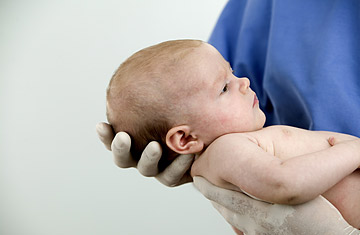
In delivery rooms across the country, a new ritual is taking place right alongside the practice of cutting the umbilical cord. Nurses and doctors are also taking a drop of blood with a quick prick of the newborn's heel, then testing the sample for an array of genetic and metabolic diseases. (Read "What Can Genetic Tests Tell You?")
According to a new March of Dimes report, all 50 states now require screening for at least 21 of a panel of 29 diseases — many of them rare but potentially debilitating or fatal — which means that 96% of the 4 million babies born each year in the U.S. are routinely tested.
Less than a decade ago, newborns weren't so fortunate. As recently as 2000, most hospitals tested for only a handful of the recommended 29 diseases, including phenylketonuria, a metabolic disorder that can result in mental retardation, and hypothyroidism, a hormone deficiency that can stunt growth and brain development. (Both conditions are treatable with special diets and hormone supplements.) In many cases, these detectable diseases can be treated or managed if caught early. In 2005, the American College of Medical Genetics recommended uniform and broader screening for the entire catalog of conditions, including amino acid deficiencies, oxidative disorders and blood diseases such as sickle cell anemia. The March of Dimes and the American Academy of Pediatrics endorsed that recommendation, and lobbied states to legislate mandatory newborn screenings. That same year, a March of Dimes survey found that only 38% of babies were getting sufficiently screened, with at least 21 of the 29 available tests. "These are rare conditions, but they can be devastating and catastrophic if not detected," says Dr. Jennifer Howse, president of the March of Dimes. Today, that percentage is closer to 100%. All 50 states test for at least 21 diseases, and 24 states screen for the entire panel of 29 conditions. That expansion of testing can be traced in part to technology; new techniques make it easier to detect specific genetic changes and the presence or absence of certain proteins that are the hallmarks of the diseases. The mandated testing means, however, that states must pick up the tab — just under $100 per newborn for the full panel of 29 tests — through Medicaid or other programs if parents' insurance programs don't cover it. To meet demand, many states have invested in building labs within their public health departments or contracted with independent labs to perform the analyses. The March of Dimes is also pushing for national guidelines and appropriations to support newborn screening now that all 50 states are on board. "We're very mindful of the tough economic situation the states are experiencing," says Howse. "But I am relatively optimistic about this program staying in place. It's much less expensive to treat these conditions than it is to manage the catastrophic illness that can occur if they are not detected."